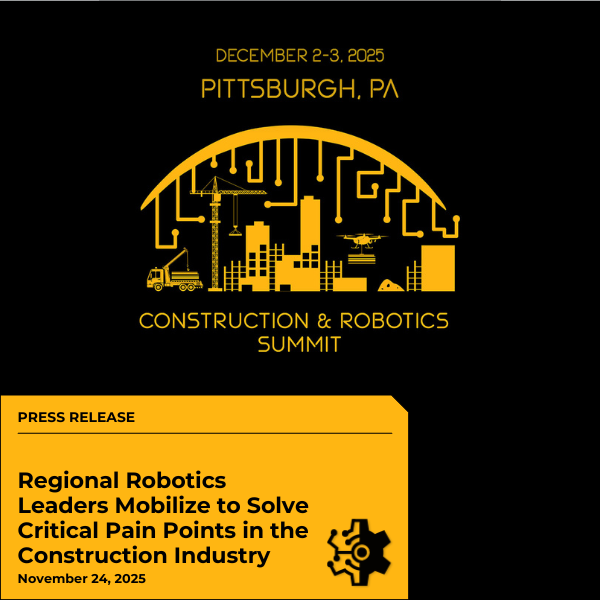.png)
By Kevin Dowling
Industrial automation is the use of technology to automate industrial processes. It uses machines, sensors, networks, software, and hardware to perform tasks previously done by humans or fixed automation.
Industrial automation has undergone a seismic shift in recent years, driven by the rapid rise of new generations of robots allowing for more complex tasks and greater sophistication in results. While large-scale manufacturing has traditionally been the primary user and beneficiary of automation technologies, new opportunities are opening for regional manufacturers of all sizes. Nowhere is this more evident than in Southwestern Pennsylvania, a region historically steeped in manufacturing but now embracing the potential of robotics to reshape its industrial landscape.
Southwestern Pennsylvania is an area rich in manufacturing expertise, thanks to its industrial history and access to resources. The region is proving its ability to adapt and become a leader in what comes next. As we move into the Fourth Industrial Revolution, defined by the World Economic Forum as “characterized by a fusion of technologies that is blurring the lines between the physical, digital, and biological sphere,” our region’s leadership in health and computer science are breathing new life into the region’s manufacturing ecosystem in the field of robotics. From Carnegie Mellon University's Robotics Institute in Pittsburgh to an increasing number of startups and innovation centers like The Robotics Factory, the area is becoming a hotbed for robotics research and application.

Robotics is redefining industrial automation by introducing capabilities that were either previously unimaginable, impractical, or too costly. Advanced robotic systems are no longer confined to repetitive, low-skill tasks. Instead, they are now equipped with artificial intelligence (AI), machine learning, and advanced sensors, enabling them to perform complex operations with precision and adaptability.
For example, robotic arms equipped with vision systems can inspect and assemble components with near micron-level accuracy. Autonomous mobile robots (AMRs) are streamlining factory logistics, transporting materials across manufacturing floors with efficiency. Collaborative robots, or cobots, can work alongside human operators, enhancing productivity and reducing the physical strain on workers.
These advancements are particularly valuable to small manufacturers, who often face challenges including labor shortages, high production costs, and the need for customization. By integrating robotics into their operations, these businesses can improve efficiency, reduce waste, and meet evolving customer demands.
One regional example are Tool and die shops in Southwestern Pennsylvania who among small manufacturers can benefit greatly from robotics-driven automation. Traditionally reliant on skilled craftsmen to produce molds, dies, and fixtures, these shops are now leveraging robotics to enhance precision and scalability.
Enhanced Precision and Quality: Robotics systems equipped with high-resolution sensors and AI can achieve accuracy levels surpassing human capability. This precision is critical for producing high-quality tools and dies to meet stringent industry standards.
Faster Turnaround Times: Automating tasks such as milling, grinding, and polishing allows tool and die shops to reduce production times, enabling them to meet tight deadlines and take on more projects.
Customization at Scale: Robotics allows manufacturers to produce small batches of customized tools efficiently, meeting the growing demand for tailored solutions in industries such as aerospace, automotive, and medical devices.
Cost Efficiency: By automating repetitive and labor-intensive tasks, robotics reduces reliance on manual labor, lowering overall production costs. This is particularly advantageous in a region where skilled labor shortages are a persistent challenge.
The Robotics Factory, an innovation hub based in Pittsburgh and operated by Innovation Works, plays a critical role in bridging the gap between manufacturers and robotics founders. By fostering collaboration and providing resources such as funding, training, and access to cutting-edge technologies, The Robotics Factory helps founders connect with local manufacturers to bring their visions to life. Their efforts create economic vitality for the region while advancing home-grown technology.
The Robotics Factory offers programs for robotics entrepreneurs, encouraging the development of solutions tailored to the unique needs of industries in the region. This dual approach fosters a symbiotic relationship between innovators and end-users, driving economic growth and technological adoption.
While the rise of robotics presents significant opportunities, it also comes with challenges that small manufacturers must navigate. The initial cost of acquiring and implementing robotic systems can be a barrier, particularly for businesses with limited capital. However, programs such as the Pennsylvania Industrial Resource Center Network (IRC) and grants from organizations like Innovation Works are helping offset these costs.
Another challenge is the need for workforce training. As robotics systems become more sophisticated, employees must develop new skills to operate, maintain, and program these technologies. Local institutions, including community colleges and technical schools, are stepping up to provide specialized training programs, ensuring that the regional workforce remains competitive.
The integration of robotics into industrial automation is more than a trend; it is a fundamental shift that is reshaping the manufacturing landscape in Southwestern Pennsylvania. For small manufacturers, including tool and die shops, this transformation offers a pathway to growth, resilience, and long-term sustainability.
To fully realize this potential, collaboration among stakeholders is essential. Universities, industry groups, and government agencies must continue to support research, training, and funding initiatives that make robotics accessible to businesses of all sizes. At the same time, manufacturers must embrace a mindset of innovation, recognizing that the adoption of robotics is not just an investment in technology but an investment in their future.
The rise of robotics is a game-changer for industrial automation, offering unprecedented opportunities for small manufacturers in Southwestern Pennsylvania. By enhancing precision, efficiency, and scalability, robotics is empowering tool and die shops and other manufacturing businesses to compete in a rapidly evolving marketplace. With support from organizations like The Robotics Factory and initiatives like those of the ARM Institute, the region is poised to become a leader in the new era of manufacturing, where robotics and human ingenuity work hand in hand to build a brighter future.
_________________________________________________________________________
Learn more about the upcoming Create Summit: Industrial Automation & Robotics

.png)
